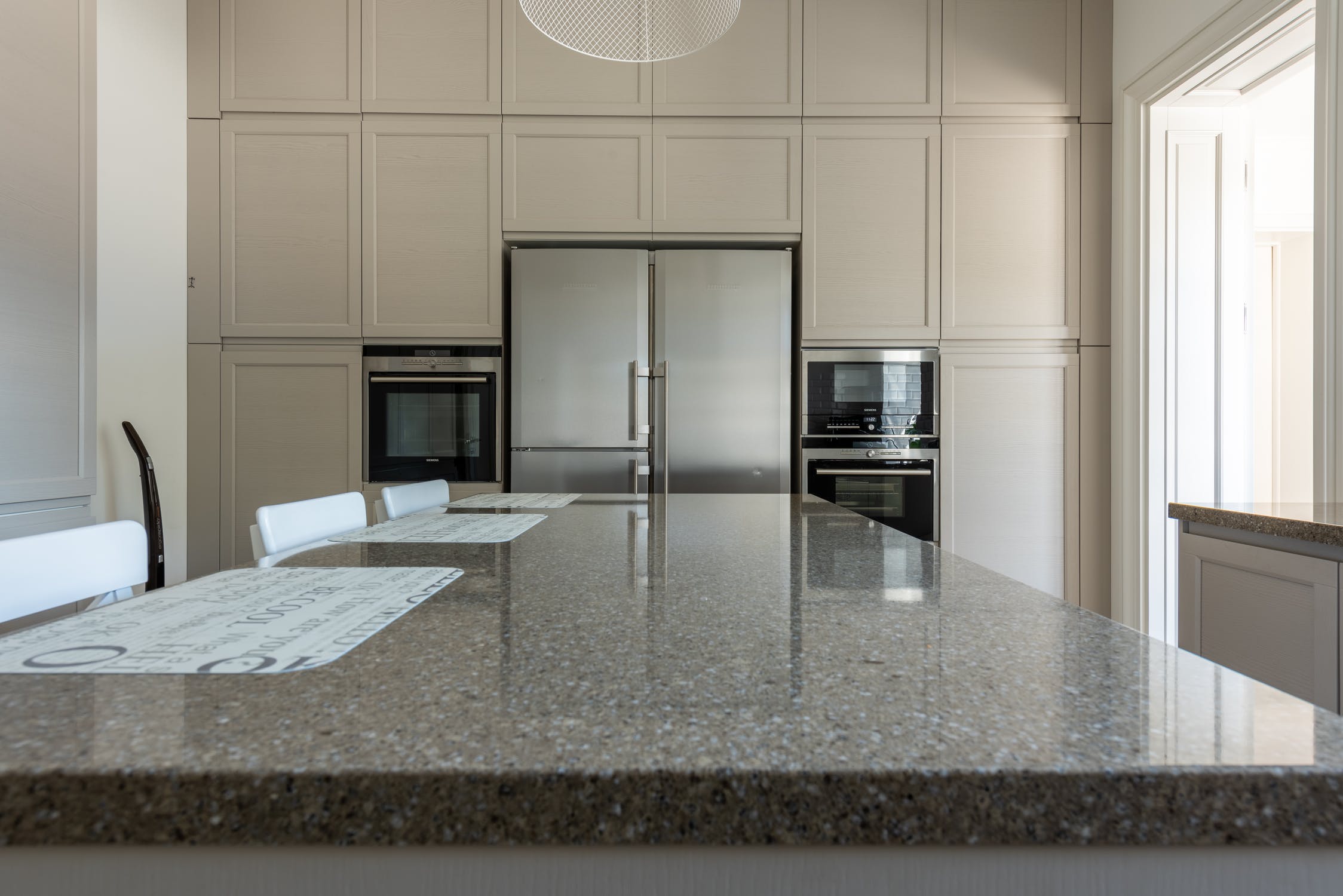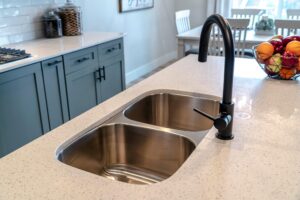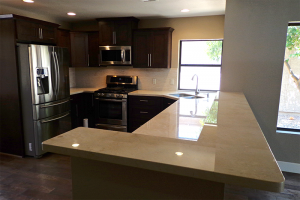You would think that discerning between natural granite and quartz would be simple, but it is not. It is especially tough for homeowners who are not familiar with the variety of materials. They may think that they know what granite or quartz should look like because of limited expertise. However, there are more varieties of both than most people think.
What Is the Difference Between Granite and Quartz
Of course, you want to be aware of what you are purchasing. No one wants to buy an engineered countertop under the mistaken belief that it is a “genuine” stone. The two materials may be presented side by side in showrooms and appear highly similar, but a salesperson will rarely try to deceive you.
But if you come across a countertop you like – perhaps in a model house or at a builders’ showcase event – you might want to know what it is so that you can reflect the look in your own home.
Knowing the difference between the two can help you decide which type of surface to use in your kitchen or bathroom. However, understanding more about granite and quartz may make you feel much more secure in your choice despite the striking resemblance.
The primary differences between the two materials are listed below. Knowing these will make you feel like a pro when you enter the slab yard or showroom.
The Appearance
Similarities
Granite is made from molten lava, which makes it an igneous rock. It is slowly cooled, which allowed the significant crystal minerals to form. Furthermore, granite often has a marbled appearance with more than one color because it has various crystal minerals such as feldspar, quartz, muscovite, etc.
Quartz also contains various crystal minerals, which give them distinctive colors and patterns. However, quartz slabs may also include any other materials that change their appearance, such as pigments. Furthermore, quartz contains some of the same materials bonded with a durable resin to look like granite.
Look Variation
Moreover, granite is a natural stone mined from the earth, so it has an infinitive range of patterns and flaws, making each slab truly one-of-a-kind. Imperfections, in this sense, do not imply that the slab is defective. But instead, it has a unique character that is difficult to reproduce in an artificial substance. Therefore, you need to choose the exact slab in your home when selecting a granite countertop because no two will look the same.
Quartz countertops nowadays, however, are frequently intended to approximate this variety rather than having a clear repeating pattern. On the other hand, quartz is an excellent example of consistency or uniformity. Furthermore, engineered quartz slabs reflect the most appealing qualities. Some homeowners appreciate this consistency in look since they know what they will get.
Look-Alikes
Engineered quartz countertops have gone a long way, so don’t expect them to appear “fake” any longer. The hues of today’s quartz countertops are very similar to those of granite, marble, limestone, and even concrete. That’s why it is far less frequent to come across a granite slab that looks like another material or a natural stone surface that looks like another. So if you happen to see a grandeur surface with the look of concrete or marble, the chances are that it is not granite but quartz.
Color
Although black, beige, brown, and white are the most common granite colors, nature has produced a fantastic color pallet. Exotic shades of green, yellow gold, pink, and blue are also available. These natural tones and patterning, ranging from subtle to vigorous, make the piece’s depth and character impossible to match.
While quartz may manufacture in any desired color, including dazzling, vibrant hues, most quartz countertops you will encounter are in neutral shades.
Finish Options
Granite is one of the most flexible countertop materials, which is one of the reasons it has remained so popular. Surface finishing options other than quartz or most other premium surfaces include honed, leathered, brushed, flamed, and polished. Although glossy is the most popular option, the other choices may better suit your personality, style of décor, and the granite pattern itself.
Manufacturers are now producing quartz countertops with customed finishes. However, they are generally only available in a glossy polished finish. There are a few matte options.
Cost Comparison
How Much Does Granite Cost?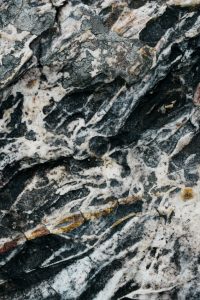
Purchasing granite and having it installed might cost anywhere from $2,000 and $4,500. You can save money by buying materials in bulk and performing some of the prep work yourself. Still, the actual fabrication and installation of the countertops should be done by a professional.
How Much Does Quartz Cost?
The average cost of installing quartz countertops is between $3,000 to $7,500, depending on the edging style and quality of quartz. Again, you can save money by doing prep work yourself. However, engineered quartz is much heavier than other stone surfaces, so a professional installer must ensure that the space is structurally sound.
Durability Factors
Natural granite is stunningly attractive, although it does have weaknesses. The stone needs to seal at installation and then reseal regularly. On the other hand, quartz does not require such a level of care. In addition, natural stone countertops, such as granite, sandstone, and slate, also stain easily.
Furthermore, sealed granite with a resin-based substance during the production process will be more resistant to problems than ordinary granite, but it will still fall short of quartz in terms of resistance. However, granite is finally more prone to cracking and chipping than manufactured stone. Both have a 25-50 year lifetime, depending on how well they are cared for and utilized. Engineered stone – quartz – outperforms natural stone in terms of durability.
Greener Building Material
During the manufacturing process, natural granite countertops emit fewer carbon emissions than quartz countertops. There are no substantial quantities of radon or volatile organic compounds emitted by either. As a green building material, granite offers a minor advantage.
Maintenance and Repairs
Granite needs resealing every year since it is a porous material. It is stain-resistant when adequately sealed. You can fill minor scratches and dents in granite using color-matched epoxy or resin available in home improvement stores. However, cracks more significant than ice cubes should repair by a professional installer.
Best Uses for Granite and Quartz
Granite
Granite is the most popular material for islands and kitchen countertops in houses in the United States. Not only does it increase the value of your property, but it’s also easy to clean and heat, and water-resistant.
In addition, granite is excellent for bathroom vanity tops because of its resistance to water and mildew. Backsplashes are also popular because they provide a sound barrier between the wall and water and oil. Granite is also popular in desktops or tabletops and fire mantles.
Quartz
Aside from countertops in the kitchen and bathroom, quartz also covers walls, used as roofing tiles, stair steps, and flooring. Because of its durability, it is becoming more popular in kitchens and coffee and dining tables.
In addition, quartz incorporates for door pockets and window seals. It is also widespread in commercial construction because of its attractiveness and durability.
More Reasons to Consider Granite
Are you still uncertain about whether granite or engineered quartz countertops are the best options for your home? Here are some more reasons why homeowners choose natural granite over quartz if that’s the case.
Nothing Beats the Real Thing
That is how homeowners who value natural materials in their homes go about it. They prefer solid wood instead of engineered or laminated wood, wool rugs rather than nylon, upholsteries are raw materials. If that describes you, you will enjoy granite’s inherent beauty and see its imperfections as a character.
That is the main reason to prefer granite, limestone, slate, and other natural stones over quartz. Because shattered quartz is present, some claim that quartz is up to 94 percent natural. True, but it’s the equivalent of claiming concrete is natural since its elements come from nature. Quartz, like concrete, is extensively treated, which detracts from the natural feel and turns off some homeowners.
When you look at a natural stone, you can notice the striations and color variations that distinguish it. The color and design are authentic. Fans of raw materials would rather have a piece of stone mined from the earth than something manufactured in a factory and artificially colored gracing their cabinets.
The Bottom Line
If you do opt for natural stone, commit to sealing it regularly, either yourself or with the help of a professional. Keep a dishrag on hand to wipe away stains as soon as possible. Pour wine and juice into glasses over the sink or a table rather than the counter. Don’t leave wet or filthy plates on them. Taking extra care will maintain the natural beauty of your home.
More Reasons to Consider Quartz
Let’s offer engineered quartz countertops a similar amount of attention. More advantages of quartz countertops for those who have chosen them for their houses are listed below.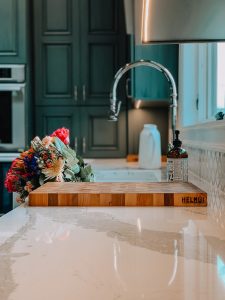
Quartz is Easier to Keep Germ-Free
Quartz is non-porous since it is a manufactured substance. There are tiny capillaries and pores within the minerals of granite, slate, and other natural stones. Those natural structures wick up moisture, and staining can occur as a result, as we have already explained. There’s more: microorganisms like bacteria and viruses live in those pores and capillaries.
On the other hand, engineered quartz’s non-porous surface will not accumulate these contaminants, making it a superior alternative for cleanliness. However, appropriately sealed natural stone performs an excellent job of keeping germs away, but there might be problems if the sealant fails.
One of the main reasons parents with young children choose quartz countertops is that they are easier to keep clean. They also make more sense for the elderly, who are more vulnerable to viruses and bacteria.
Some Granite is Dyed
Always check to see whether the granite you are looking at is dyed. It is especially true with black granite samples. Over time, dyed granite becomes blotchy or may fade, especially in areas that often get wet and areas you clean more often. Furthermore, because of the consistent pigmentation, quartz will remain very colorfast.
The Bottom Line
If engineered works for you as natural stone, you want something that requires less maintenance and offers more color options, then engineered quartz is for you. They are durable, good-looking, and strain-resistant. In addition, they are easy to clean, and you will be confident about the dirt and germs.
Considering Both Granite and Quartz
There is a lot to consider when it comes to choosing between granite and quartz. That includes durability, maintenance, appearance, cost, and location of installation. Both have their advantages and disadvantages.
Both materials come in a variety of pricing ranges. The price depends on the quality, the rarity of the color, and the location where it was mined or made. However, whatever material you pick should reflect your habits and personality. Furthermore, they are equally stylish and beautiful.
You might consider granite countertops if you are an avid cooker accustomed to placing hot pans and pots on your countertop surface. However, strive to change your certain habits so that your quartz countertops will not damage.
On the other hand, quartz countertops are a good option if you do not want to deal with the level of maintenance needed by granite countertops, such as sealing at least twice a year. However, quartz does not require the use of a sealer, which is ideal for those who would rather not have to maintain their counters.
There is no clear winner in this game. It all comes down to your style, personal choices, habits, and specific needs.
Schedule Your Granite or Quartz Installation
Are you ready for natural stone or quartz countertops and a hassle-free installation process? Contact us at (602) 513-6886 and speak to our experts.
Granite Dude also provides free estimates. Just simply provide us with a rough layout of the area and a few other details. You can guarantee that we will get you a competitive price based on your desired color and quality.

